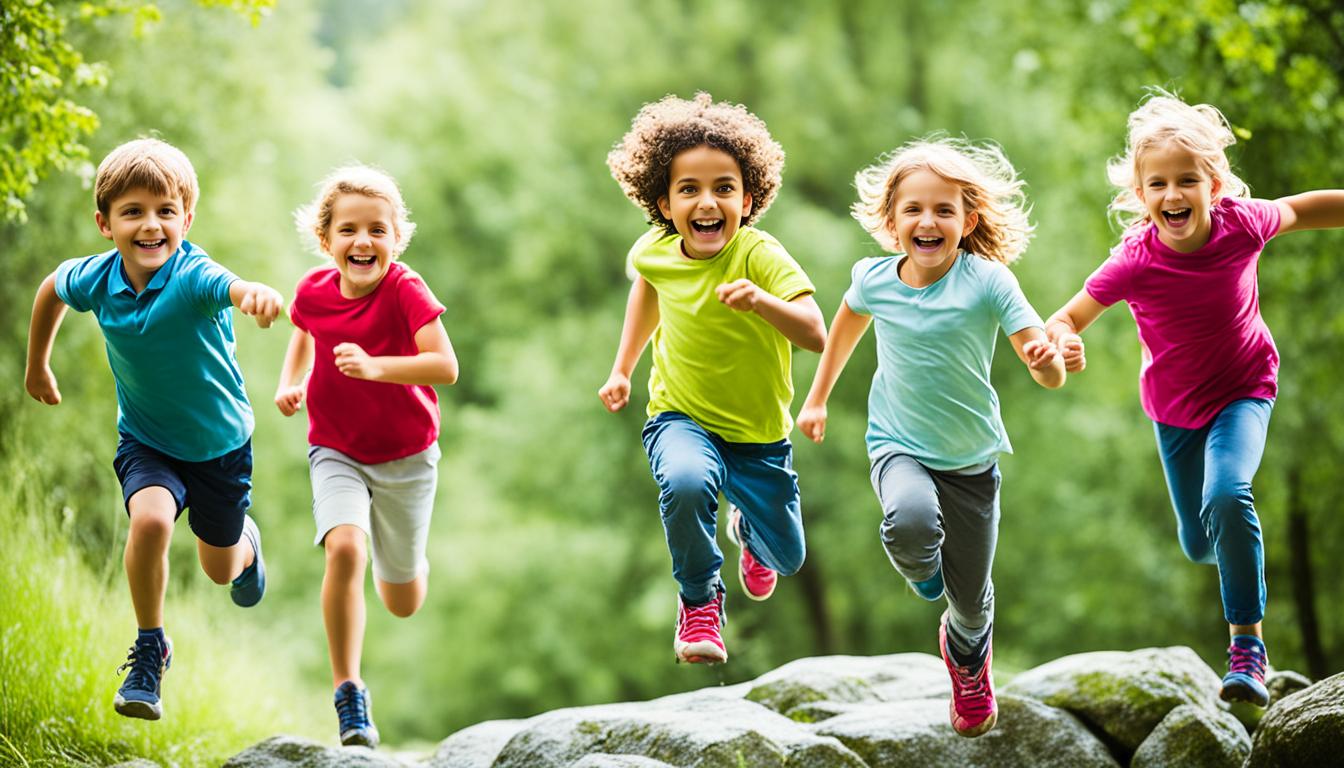Do you remember running barefoot through the grass, feeling the wind, and enjoying the sun? Those moments were key to your growth. They helped build your self-esteem and creativity. Outdoor play is vital today, given kids spend seven hours a day on screens.
Now, only 7% of kids were obese in 1980, but over a third are today. Outdoor play is key for their health, social skills, and emotional strength. It helps them connect with nature.
Marissa and Kate saw how outdoor play enriches learning and social skills in toddlers. It engages all five senses, promoting growth beyond school. Outdoor play lets kids grow at their pace, building confidence and facing new challenges.
Kids who play outside are more energetic, less stressed, and creative. They make better friends and value nature more. Public spaces let kids meet new friends, boosting social skills and community feeling. Outdoor play is crucial for a balanced, happy childhood.
Key Takeaways
- Outdoor play boosts creativity and social skills in children.
- It reduces stress and builds confidence in kids.
- Outdoor activities keep children healthy, maintaining a good BMI.
- Public spaces help kids make friends and build community.
- Playing outside teaches kids to appreciate nature.
Physical Health Improvements Through Outdoor Play
Outdoor play is key for kids’ health, helping them grow and stay well. It boosts their physical health in many ways.
Advanced Motor Skills
Outdoor fun like climbing, running, and using balance toys helps kids get better at moving. These activities improve *agility, balance,* and *coordination*. These skills are important for staying active.
Kids who play outside a lot tend to get these skills early. This helps them be physically fit for life.
Lower Body Mass Index
Being active outside keeps kids at a healthy weight, lowering obesity risks. It makes them burn more calories, keeping them fit and healthy. This kind of play helps kids develop good habits.
It also teaches them about the *importance of sleep for kids*, which exercise outdoors can improve.
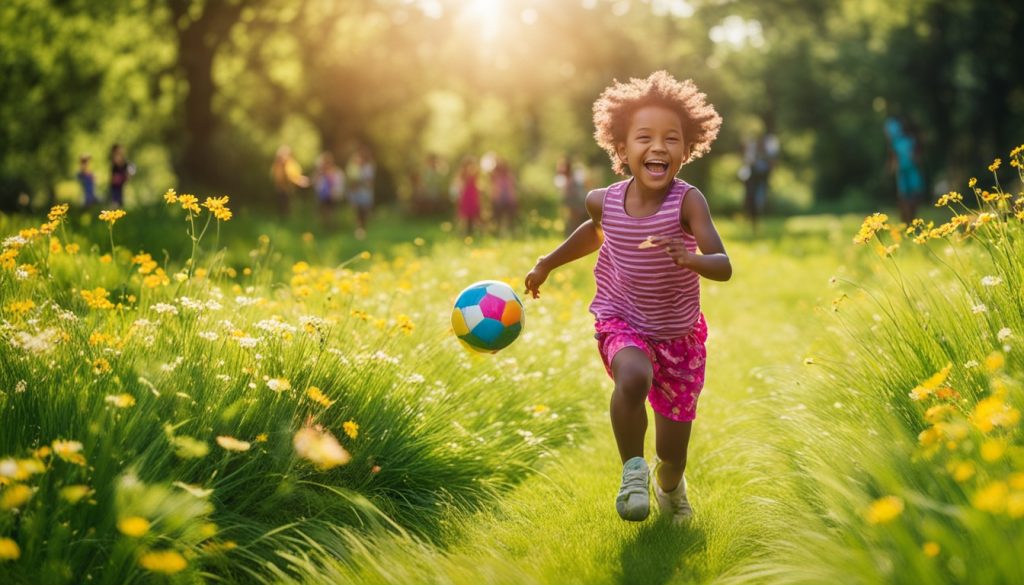
Better General Health
Being outside is good for kids’ overall health. Sunlight helps make vitamin D, which is key for strong bones and a healthy immune system. Outdoor play also makes kids happier, less stressed, and better at handling their feelings.
It helps them sleep better and stay healthy by mixing exercise with a healthy lifestyle.
The *Prescribe Outside* program in Philadelphia shows how important outdoor time is for kids. Activities like scavenger hunts and gardening boost *child physical activity*. They also make kids more creative and love nature more.
Social Benefits of Outdoor Play
Outdoor play is great for kids, helping them grow in many ways. It lets them learn important skills and have experiences that help them become better people.
Easier Communication With Others
Kids who play outside often talk with others. This helps them get better at sharing their thoughts and ideas. They learn to speak and listen in a friendly way, making communication easier.
Improved Peer-to-Peer Relationships
Playing outside means kids work together and make friends. They learn to work as a team and solve problems together. This helps them understand others and be more caring.
Appreciation for the Environment
Being outside helps kids love nature more. They learn to respect and protect the environment. This teaches them about the world’s diversity and why it’s important to keep it safe.
Playing outside also boosts Encouraging Child Creativity. Kids can make up games, build their own worlds, and solve problems in new ways. This kind of play helps them think creatively.
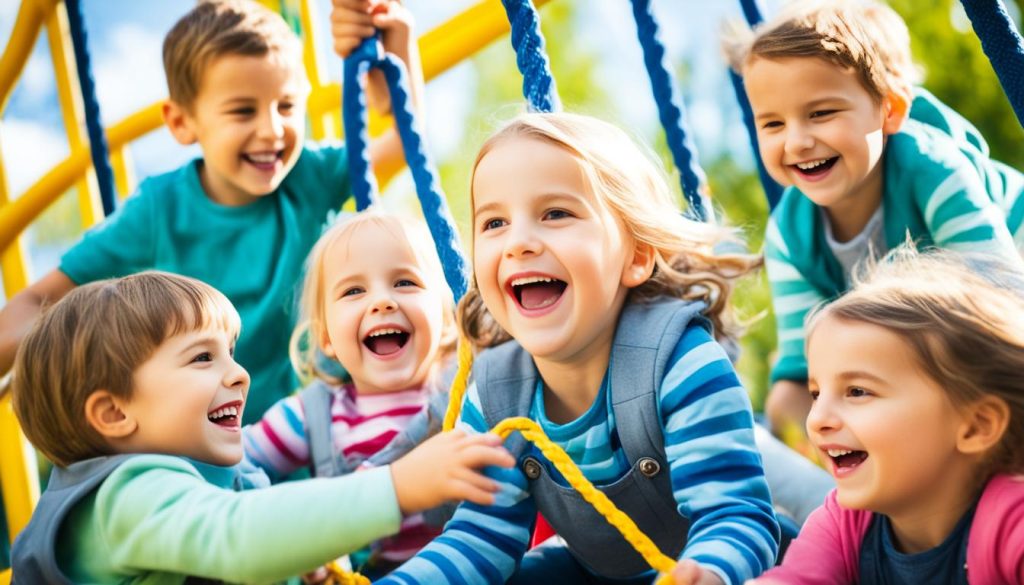
Emotional Development Benefits
Emotional growth is key to a child’s development, shaped by outdoor play. Positive parenting helps kids handle their feelings and grow strong. This part looks at how outdoor activities boost emotional smarts in kids.
Building Confidence and Independence
Outdoor play is great for making kids more independent. Kids can try new things and learn about risks safely. This helps them feel more confident. Positive parenting and outdoor fun make kids more self-sufficient and strong.
Use of All Five Senses
Playing outside helps kids use all five senses. They see, touch, smell, hear, and sometimes taste the world around them. This helps them understand and make sense of their feelings, which is important for emotional smarts.
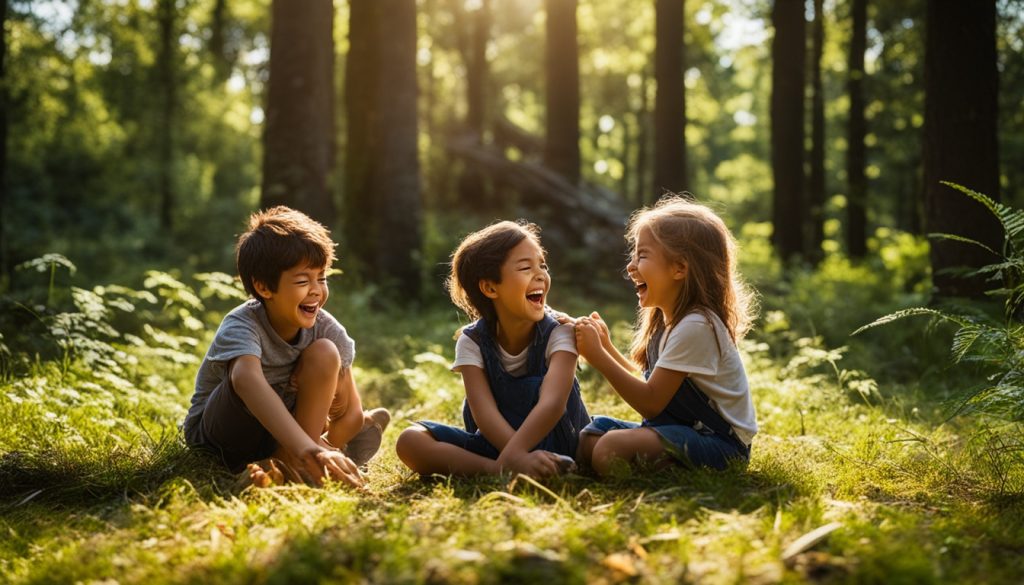
Natural Mood Enhancement
Sunlight and fresh air make people happier. Being in the sun boosts Vitamin D, which helps with mood and feelings. This can teach kids to be thankful for the simple joys of being outside.
Emotional Benefits Statistics
| Year | Study/Publication | Focus | Implications |
|---|---|---|---|
| 2016 | 509-520 diagnoses | Relational pathology in early childhood | Early interventions in parenting can mitigate emotional issues |
| 2009 | Transactional model focus | Child psychology | Promotes understanding of emotional interactions |
| 2017 | Review of disorganized attachment | Infancy | Key for clinicians and policymakers |
Intellectual Growth Through Exploration
Outdoor play is key to boosting a child’s brain power. The outdoors is full of chances for kids to invent, discover, and solve problems. These activities are great for their mental health. They turn outdoor spaces into places where kids can learn and try new things, helping their brains grow.
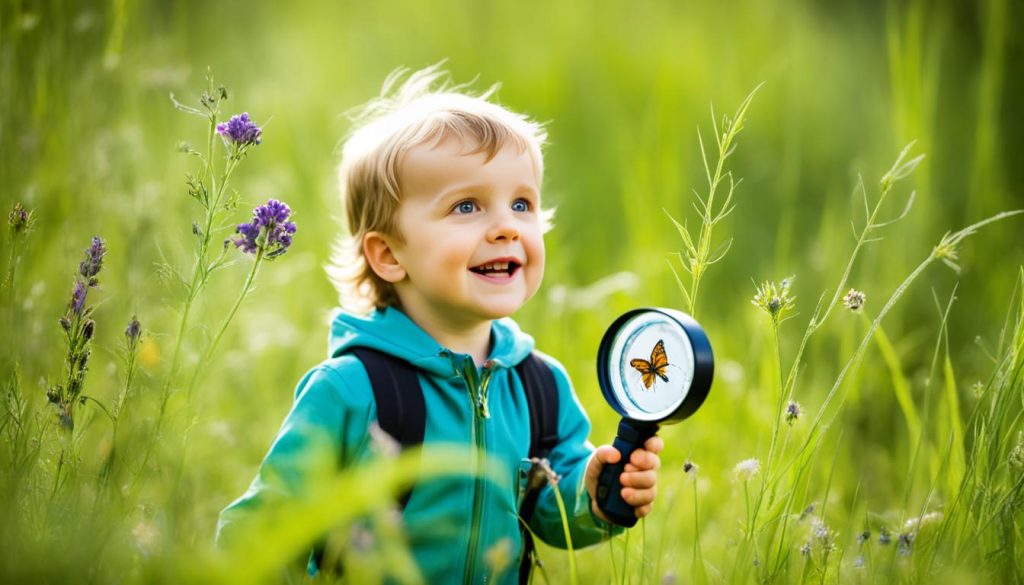
Outdoor play lets kids use their own way of learning. This means every child can find something fun and useful to do. Some kids love moving around, while others like to watch and learn. Both ways help kids keep learning and growing.
Studies show that playing is key for kids’ brains. It helps them solve problems, control their feelings, and get along with others.
Data suggests that providing children with appropriate challenges tailored to their capabilities prevents a loss of motivation and promotes continuous improvement.
This shows how important it is to give kids activities that match their skills. It helps them keep wanting to learn and get better.
Outdoor activities also help kids’ minds and hearts. They reduce stress and make kids naturally curious. This curiosity can lead to doing well in school and succeeding later on.
| Aspect | Benefit |
|---|---|
| Exploration | Stimulates cognitive development and problem-solving skills |
| Creative Play | Encourages invention and discovery, leading to lifelong learning in children |
| Responsive Activities | Tailors experiences to child learning styles, preventing loss of motivation |
| Stress Relief | Supports child mental health, fostering a passion for learning |
Outdoor Play and Mental Health
Outdoor play is key for supporting child mental health. Being in nature helps reduce stress and anxiety in kids. This is because nature is calm and active play lowers stress hormones and helps kids cope with anxiety.
Reducing Stress and Anxiety
A study found kids who play outside are smarter, happier, and less anxious. Nature and physical activity lower stress hormones and blood pressure. This makes kids calm and relaxed. Adding outdoor play to daily life helps manage tantrums and boosts emotional health.
Boosting Overall Happiness
Being outside is good for kids and adults alike. The biophilia hypothesis says humans need nature. Outdoor activities use more senses than screens, making kids happier. Regular outdoor activities, like evening walks or eating outside, bring joy and well-being to kids.
Here is a comparative table that highlights the mental health benefits of outdoor play:
| Activity | Mental Health Benefit |
|---|---|
| Playing in Nature | Lower Stress Levels |
| Group Outdoor Games | Improved Socialization |
| Walking in Parks | Increased Overall Happiness |
| Outdoor Arts and Crafts | Enhanced Creativity |
Adding outdoor activities to your child’s life greatly improves their mental health. Positive reinforcement parenting, like having a go-bag for outdoor adventures, shows kids nature is fun and important. It also teaches them responsibility and helps them grow positively.
The Role of Outdoor Play in Child Development Milestones
Outdoor play is key to reaching important child development milestones. As kids play less, it’s vital to make sure they do activities that help them grow. Doctors even give a “prescription for play” during check-ups to highlight how crucial play is for early growth.
Activities like climbing, swinging, and playing with friends help prepare kids for kindergarten. Kids who experience different things outside are more likely to get important social and thinking skills. In fact, those who play freely early on have these skills as they get older.
A study in 2016 says kids under five should be active all day. This helps them reach physical child development milestones and builds a growth mindset for kids. Letting kids explore and try new things during play helps them be resilient and adaptable.
Recent research shows kids who play outside are better at controlling their feelings and feel less stressed after 15 minutes of play. This is twice as true as listening to a story.
Outdoor play also helps build resilience in kids. Kids who play outside often are better at dealing with life’s ups and downs. They learn to handle different social situations, take risks, and solve problems. By encouraging outdoor activities, parents help support their kids’ mental health and get them ready for school and social life. For more on supporting your child’s mental health, check out this link.
The link between outdoor play and big child development milestones is clear. Giving kids time and space to play freely helps with physical, social, emotional, and thinking growth. This all-around growth is key in preparing kids for kindergarten and beyond, making a generation that’s well-rounded and resilient.
| Benefits | Examples | Impact |
|---|---|---|
| Physical Development | Running, Climbing | Improved Motor Skills |
| Social Skills | Group Play, Sharing | Better Peer Relationships |
| Emotional Resilience | Risk-taking, Problem-solving | Enhanced Coping Skills |
| Intellectual Growth | Exploration, Curiosity | Boosted Cognitive Abilities |
Effective Strategies to Encourage Outdoor Play
Over the past 30 years, kids have played outside less. It’s key to use strategies to get them outside more. Finding a balance between work and family means planning and doing activities that make kids love nature.
Incorporating Nature-Based Activities
Adding nature activities is crucial for discipline. Simple things like walking in nature, playing in parks, or digging in dirt are great. These activities boost the immune system, lower heart disease risks, and help with anxiety.
They also help with sibling fights by encouraging teamwork and discovery together.
Creating Structured and Unstructured Playtime
It’s important to mix structured and free play. Setting up family game nights or nature trips builds family bonds and skills. Structured play can teach new things, while free play lets kids be creative and solve problems.
- Structured Play Activities:
- Organized sports games
- Educational outdoor games
- Fitness challenges
- Free play in local parks
- Building forts and imaginative play
- Nature exploration
Playing with neighbors makes neighborhoods more lively and friendly. Trying new things builds confidence and skills. This helps balance work and family life by sharing activities and interests.
Using products that encourage outdoor play is also helpful. For example, the 2-in-1 Toddler Mini-Trike/Balance Bike with Wicker Basket costs $149.99. The HipKids Classic Steel Bike with Wicker Basket is $189.99. These items help with structured play and let kids explore freely.
Using these strategies and balanced activities can make kids love the outdoors. It helps their health and growth in social and emotional areas.
The Connection Between Parenting and Raising Kids and Outdoor Activities
In today’s fast-paced world, parenting in the digital age brings unique challenges. But it also opens doors to innovative ways of strengthening the parent-child bond through outdoor activities. By spending time outdoors, families can instill a sense of respect, empathy, and responsibility in children. This fosters better communication and teaches kids manners.
Fostering Parent-Child Communication Outdoors
Nature’s vast landscapes provide countless opportunities for meaningful conversations between parents and their children. Whether it’s during a hike or a picnic in the park, these moments encourage open dialogue. By discussing their surroundings, parents can teach their children to appreciate nature. They can also cultivate family respect and empathy.
Setting Boundaries and Teaching Responsibility
Outdoor activities are great for teaching kids about boundaries and responsibility. In the digital age, where screens dominate, setting boundaries in nature offers a refreshing break. Children learn to navigate their surroundings safely. This fosters independence and a sense of responsibility.
Positive Parenting Reinforcement
Positive reinforcement is key in parenting, especially in outdoor activities. Praising children for their efforts and achievements boosts their confidence. It also strengthens the parent-child bond. This approach, combined with teaching kids manners, instills values that last a lifetime.
Consider the statistics and insights from parenting experiences:
| Insight | Percentage/Observation |
|---|---|
| Parents adjusting outdoor activities after having a child | Varied responses; some found it easier before toddler age, others adapted hobbies (Samantha Williams, Cirrus Tan, Dr. Favia Dubyk) |
| Parents needing extra support for outdoor activities | Mixed; some had support systems, others found creative solutions (Janelle Hill, Fred Campbell, Cirrus Tan) |
| Frequency of outdoor activities for parents | Multiple times a week, indicating a balance between parenthood and personal interests (Cirrus Tan) |
| Parental perspective on risk assessment for children | Varied; some were cautious, others allowed careful, riskier engagement (Fred Campbell, Janelle Hill) |
| Influence of parental attitudes on children’s outdoor engagement | Parents led by example, emphasizing the importance of encouraging a love for the outdoors (Janelle Hill) |
| Utilization of therapy for addressing parental fears | Suggestions for therapy to overcome fears related to outdoor activities (Nyesha & Samantha) |
| Maintaining personal identity post-parenthood | Parents stressed the importance of continuing activities that bring personal joy (Favia Dubyk, Fred Campbell) |
Conclusion
Outdoor play is more than just fun for kids. Studies show it’s key for their growth. It helps with physical, social, emotional, and intellectual development.
Parents are key in teaching kids to be kind. They shape their well-being and growth. By supporting their hobbies and outdoor activities, kids learn important skills.
Talking with kids about life helps shape their values and actions. Teaching them about money and nutrition early sets them up for success. Outdoor play boosts their motor skills and helps them make friends.
Modern parenting values giving kids freedom and letting them express themselves. This approach helps kids handle challenges better. Outdoor play and good parenting create a great environment for kids to grow and succeed.
Your Action Plan for Promoting Outdoor Play
Start by understanding how outdoor play benefits your kids. Then, set aside time each day for outdoor fun. This helps manage screen time and lets your child enjoy the outdoors.
Try different activities like nature walks, park games, or backyard fun. This makes outdoor time exciting and enjoyable for everyone.
Creating family traditions for outdoor play helps everyone join in. You could go on hikes, have picnics, or plant a garden together. The American Academy of Pediatrics suggests limiting screen time to one to two hours a day. This leads to a healthier, more active life.
By choosing outdoor activities, you help your kids feel less stressed and anxious. They’ll also have better heart health, mood, and focus.
Use discipline to support outdoor play. Set rules about screen time and reward being active. Encourage hobbies like bird-watching or cycling to make your kids love nature and stay fit.
Outdoor play does more than improve health. It boosts emotional strength, creativity, and social skills. These are key for happy, well-rounded kids.
FAQ
What are the key benefits of outdoor play for child development?
How does outdoor play improve physical health in children?
What social benefits do children gain from outdoor play?
How does playing outside support emotional development in children?
In what ways does outdoor play foster intellectual growth?
Can outdoor play impact a child’s mental health?
How does outdoor play help with reaching child development milestones?
What are some effective strategies to encourage outdoor play?
How can parents utilize outdoor activities to strengthen the parent-child bond?
What is the best way to incorporate outdoor play into a child’s daily routine?
This post contains affiliate links. If you click on a link and make a purchase, I may earn a small commission — at no extra cost to you. Thank you for supporting this blog and helping me keep the patterns free! Read the full Affiliate Disclosure & Transparency.
